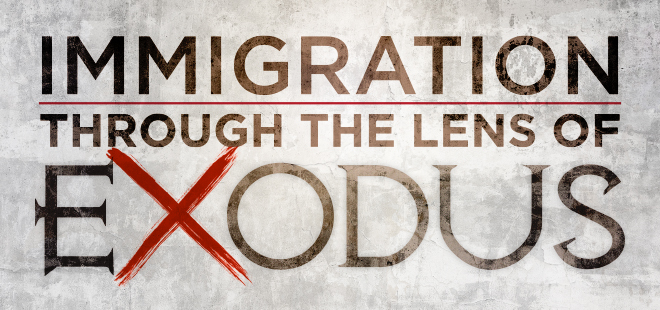This article was imported from our previous website, which many have broken some of the content. We apologize in advance for any strange formatting or broken links you may find.

Immigration has been making national and international news headlines. As The Well takes a journey through the book of Exodus, there is no better time to examine what this narrative can teach us about our present situation.
The church, and each individual member of the body of Christ, is called to live out God’s kingdom ethic that comes through in the book of Exodus and Jesus’ own life. Exodus is a journey of the people of God immigrating in and out of a foreign land. The experiences they had in Egypt and in the desert would be foundational for the rest of their history. What happened in their journey is remembered and celebrated year after year, through the Passover and Feast of Tabernacles (for example).
This period of Israel’s history would cement many lessons, from the knowledge that God hears their suffering (in Egypt and in the desert), He is a liberator and will set His people free (from Pharaoh) and He provides for their daily needs (with manna and water). These are pivotal lessons, but one theme God and the author of Exodus lift up for us is that their journey in Exodus should be a lesson for how to handle immigrants:
"You shall not oppress a sojourner. You know the heart of a sojourner, for you were sojourners in the land of Egypt." – Exodus 23:9 (emphasis added)
The heart of the command for God’s people was to remember:
- Remember what it was like to be forced to work for unfair no wages.
- Remember what it was like when Pharaoh killed your baby boys.
- Remember what it was like to have no ability to provide for yourself, but to be dependent on a slave master to feed you and your family.
- Remember what the experience was like of wandering the desert with no hope of ever arriving at a destination.
- Remember the fear as you approached a new land and its citizens.
- Remember.
What does He ask them to do with this remembering? Have compassion and treat people the way they would want to be treated (Luke 6:31).
After the Exodus experience, God lays down the law a second time (see Deuteronomy). He tells the people their hearts are to be His, and that if their hearts are tied to His they will love the immigrant:
So now, O Israel, what does the LORD your God require of you? Only to fear the LORD your God, to walk in all his ways, to love him, to serve the LORD your God with all your heart and with all your soul, and to keep the commandments of the LORD your God and his decrees that I am commanding you today, for your own well-being. Although heaven and the heaven of heavens belong to the LORD your God, the earth with all that is in it, yet the LORD set his heart in love on your ancestors alone and chose you, their descendants after them, out of all the peoples, as it is today. Circumcise, then, the foreskin of your heart, and do not be stubborn any longer. For the LORD your God is God of gods and Lord of lords, the great God, mighty and awesome, who is not partial and takes no bribe, who executes justice for the orphan and the widow, and who loves the strangers, providing them food and clothing. You shall also love the stranger, for you were strangers in the land of Egypt. You shall fear the LORD your God; him alone you shall worship; to him you shall hold fast, and by his name you shall swear. He is your praise; he is your God, who has done for you these great and awesome things that your own eyes have seen. – Deuteronomy 10:12–21, NRSV (emphasis added)
I could go on and on listing verses like these, but ultimately what I hear God saying through the books of Exodus and Deuteronomy is this:
I love you and have chosen you.
You once were immigrants.
I love and take care of immigrants.
Take care of immigrants.
We know this was Jesus’ heart as well. He did not divide or separate Himself by race, class or gender. He was highly criticized by the religious elite for it, and it was one of the many things that led to their frustration and His death.
As He began His ministry on this earth He made His objectives clear:
“The Spirit of the Lord is upon me,
because he has anointed me
to proclaim good news to the poor.
He has sent me to proclaim liberty to the captives
and recovering of sight to the blind,
to set at liberty those who are oppressed,
to proclaim the year of the Lord’s favor.”
– Luke 4:18-19
So how do we apply this today? This is a challenge to us as believers to recognize that, as Christians, we are grafted into the story of the Jews’ immigration out of Egypt. Their story is now our story. We all have a history and personal stories of immigration to these United States.
During this series on Exodus, I encourage you to read the book through the lens of the immigrant – to remember and see God’s heart for you and God’s heart for them. Remember this clear pattern, and go and do likewise. I believe God is saying to you:
I love you and have chosen you.
You once were an immigrant.
I love and take care of immigrants.
Take care of immigrants.
If you want to delve into immigration issues from a Christ-centered perspective, I recommend The Evangelical Immigration Table and Welcoming the Stranger.